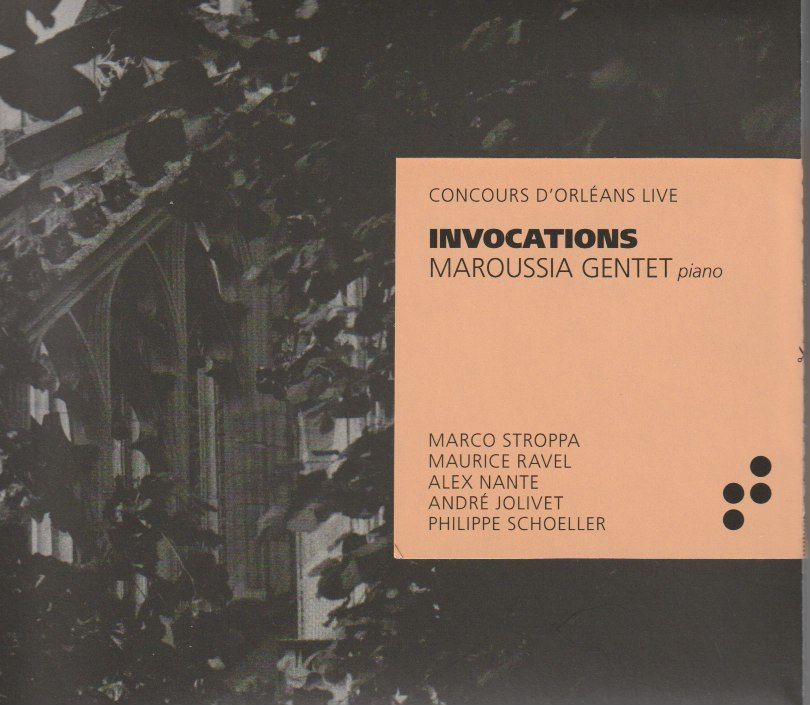Invocations: Maroussia Gentet and the Concours d'Orléans
Gentet's disc is a beautifully realised, well-balanced recital of great interest

The Concours d'Orléans is the only piano competition in the World that specialises in contemporary music. The 2022 competition finished on Sunday, with a jury headed by the great French composer Philippe Manoury and that includes Tamara Stefanovich and Francesco Tristano. My report will appear in International Piano magazine, along with a review of the most recent disc in their series, L'oiseau rebelle (a recital of composers as diverse as C. P. E. Bach, Rued Langgaard, Stockhausen, Cage, Rossini and Cardew).
The standard at the Orléans Competition is magnificently high, as one can hear in this disc by the 2018 winner, Maroussia Gentet (click for biography). In addition to winning first prize in 2018, Gentet won five other prizes (there are a lot of prizes in this competition).
In many instances, the ink is probably still wet on the paper as the pianists play these works. Gentet's sound is rich and full, perfect for Marco Stroppa's "Tangata Manu" (from his Miniature estrose, Libro primo). As Gentet puts it in an interview included with the disc, "the timbre creates the work. You plunge into resonance". There are moments of exquisite play (around the 2"30-3" mark) that prepare one for the Ravel that follows. Anyway, let's treat ourselves to two performances by Gentet of this work, firstly from this disc (as the second is also a video, so we can see the artist at work):
and then a video live performance from the XXVIII Rassegna Internazionale di Musica Moderna e Contemporanea
Out of the upward spiral followed by a final quiet gesture that hangs in the air that closes the Stroppa emerges Ravel's miraculous Miroirs. Here it is the clarity of Gentet's approach that impresses. Listen to how beautiful the opeing "Noctuelles" becomes when it is not needlessly bathed in pedal:
... we experience "Oiseaux tristes" with fresh ears, too, as we begin to hear the implicit modernism in the music:
You can hear the depth of resonance of the piano in "Une barque sur l'océan" (as well as its finely tuned treble). The holy grail of creating the right atmosphere but also enabling every note to sound is surely fully realised here:
If I find Gentet's "Alborada del gracioso" less than convincing in the opening section, the slower, contrasting part is simply lovely, as is the final, highly atmospheric, "Vallée des cloches" (Valley of the bells):
Gentet's Miroirs is a lovely performance. Of a rather more advanced harmonic language, Alex Nante's Invocation of 2017 nevertheless seems to contain Impressionist references in its swirls of right-hand notes (between two and three minutes in). It was written by Nante for Gentet to play in the thirteenth edition of teh Orléans Compstition and is inspired by the poem Misticos by José Lius Achaval. Here's a video of Gentet performing this piece:
André Jolivet's music is nowhere near as well known in the UK that it should be. Born in 1905 in Montmartre,he was one of the co-founders of the group La Jeune France (along with one Olivier Messiaen). Written in 1935, Mana comprises six pieces; there is a pronounced Schoenbergian influence in some. All credit to Gentet for letting the silences speak so powerfully when required. The final piece is possibly the most complex, "Pégase," and hear we can appreciate how Gentet conveys clarity of texture even at moments of some power:
Gentet premiered the Philipps Schoeller Préludes in Parma. In the interview included with the disc, Gentet points out that in both the Nante and the Schoeller there is a distinct narrative element, and it is this that speaks to audiences. Schoeller's Préludes are inspired by three painters: "Ommaggio Cy Twombly"; "In Memoriam Jackson Pollock"'; "Ritualis Vincent van Gogh".
There are moments of real profundity to the "Ommagio a Cy Twombly" (also literally profound as in deep in a registral way) while a sense of space seems to invoke the ghost f Morton Feldman. Gentet's performance here is absolutely mesmeric, her control within extreme pianissimo remarkable.
The second movement, "In Memoriam Jackson Pollock," features some preparation to the piano - again, resonance is key as the sounds, metallic and deliberately muffled, echo around the sound space. Unsurprisingly, we hear painterly splashes of sound elsewhere:
Interestingly, "Ritualis Vincent van Gogh" is more active than the title led me at least to believe, although its close (it's only two minutes long) attains a sense of ritualistic fervour:
Gentet's disc is a beautifully realised, well-balanced recital of great interest.
These discs are part of the prizes for the competition winners, so one awaits this year's winner's disc with bated breath: Lorenzo Soulès gave a simply phenomenal performance of Manoury's magnificent Pasacaille pour Tokyo in the final.
Worth mentioning there are two booklets included (one of which functions also as a fold-out poster) as I nearly missed the one with the notes on the pieces!
One of the most laudable musical projects in the World today, the Orléans competition is far more than just a competition - it includes recitals and concerts (Steven Isserlis was a guest this year, while members of the Orchestre Symphonique d'Orléans along with a laureate of the 14th Competition, Chae-Um Kim gave a recital of music by Ibert, Henri Tomasi and Poulenc, for example).
Invocations Gentet